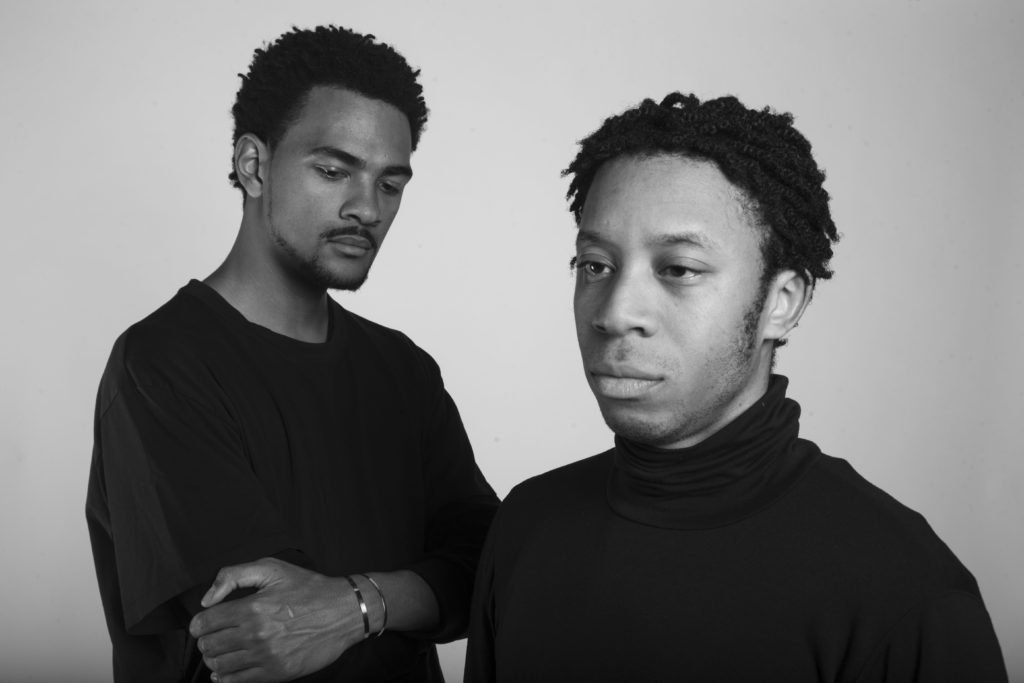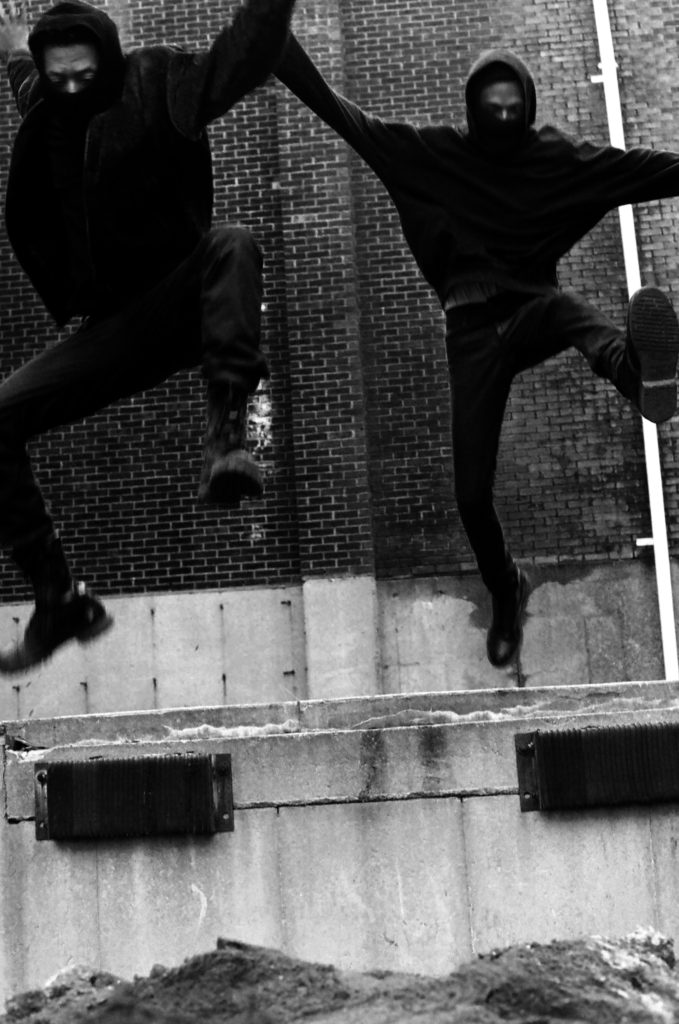
Photo by OJ Slaughter
Note: This article mentions upcoming shows whose dates may change due to the current situation surrounding COVID-19. The MFA Late Nights show has been rescheduled from April to June. As of publication, Boston Calling is still scheduled for May 22nd to 24th, with Camp Blood set to perform on the 23rd; if that changes, we will update the piece accordingly and share that information on social media.
“Camp Blood is the most important band in the world.” This is how the conversation ends, the last words Shaka Dendy offers before he and Haasan Barclay get off the phone. It’s a hell of a way to close an interview: brash, bold, confident; a gauntlet thrown not just at the feet of every other musical act out there, but also in their faces with panache and a “fuck you, I won’t do what you tell me” attitude. Yet, even over the phone, there’s a calm, cool tone to Dendy’s voice that denotes he’s not hyperbolizing at all. There’s conviction there, and you can tell that he unquestionably, wholeheartedly believes that this is the truth.
And you know what? Fuck it. There’s a case to be made.
In case you’re unfamiliar with Camp Blood – comprised of Haasan Barclay and Shaka Dendy, a duo that swaps bars like they’re running a relay race with a lit stick of dynamite – then do yourself a favor and check out their debut self-titled EP while you keep reading. Without a doubt, they are treading ground that no one else in Boston or beyond has really discovered yet. Their sound is unfathomably unique and untethered to genre. While they pull influence from industrial, hardcore rap, punk, and more, they are more than the sum of these influences; they transcend categorization and eschew strict genre labels, preferring instead to craft something that’s vastly unheard of to this point.
The group came to life out of discussions that Barclay and Dendy had regarding what they saw in the current state of music: they shared a view that outside of a handful of artists, there aren’t currently too many big names who are really challenging anything or saying much at all. As Dendy puts it, “We talked about that from the beginning: where Camp Blood fit into the landscape and cycle of music. For a long time, it’s been the same kind of mediocre, bad music that people have been programmed to like. It’s just stale.” Barclay adds to this sentiment, stressing the need to move culture forward rather than let it stagnate. “I think about kids now who haven’t grown up with musicians who challenge things. [They want] to see something new and more aggressive. ” He’s spot on invoking the power of youth right now; Gen Z is fired up socially and politically; staring down the barrel of gun loaded with stagnant American democracy; widespread fear and panic; unrelenting climate change; the rapid spread of a new disease; plus an ever-growing list of grievances and problems that seem not to bother Boomers and above.
Those initial conversations led to eventual collaboration. Haasan Barclay had already established himself as a staple in the Boston scene; much like Camp Blood’s hard to pin down style, his solo oeuvre existed on the border between psychedelic rock and R&B, plus an array of other genres and influences. Shaka Dendy – who was born in Boston, but spent a lot of his upbringing in Florida – moved back to Mass in 2015 for grad school to study film. Since then, he’s found work as a multimedia artist, mixing sculpture, film, music and more to craft an aesthetic all his own. He describes their eventual union as a realization “that we were seeing eye to eye and had a good overlap on our Venn diagram. Then it sort of naturally started happening. I feel like once we knew that and were comfortable with it, we didn’t really have to think about it; it started happening.” On top of this, Barclay adds, “As soon as we finished “Aerosol,” I was like, okay we’ve just got to do this a couple more times.” It’s like they did a DBZ-inspired Fusion Dance to create a monolithic, unrelenting force of musical power and finesse.
Currently, the group is riding the wave of a new music video for their songs “IDK” and “1144.” On the choice to package the songs together with one shared visual piece, the group felt that IDK’s short run time, the two songs’ mutual compatibility, and the shared lyrical content made them the perfect double bill. The video watches like an episode of The X-Files injected with 100 CCs of pure punk energy. Barclay and Dendy trade bars in an undisclosed location in what feels like the middle of nowhere. The hazy night vision effect that carries through the video makes it feel like some found-footage fever dream. “It was a decommissioned bus yard for the MBTA. I don’t know when it shut down, but it was probably before we were all born. It became a haven for graffiti and public art. It was cool to reclaim that area and make it look otherworldly.”
In June, Camp Blood will perform at the Museum of Fine Arts’ Late Nights series during a night celebrating the work of artist Jean-Michel Basquiat, the first time his work will be displayed in Boston. But easily the biggest gig that the band has on their upcoming schedule is the Boston Calling festival in the spring. While the festival has become a local staple to bring the area’s music fans together, it has in the past faced some criticism over its lack of representation from local artists. This seemed to come to a head in 2019, especially from local artists of color. Thankfully, the festival’s organizers seem to have heard the call and responded, scheduling a small host of local talent, which includes Camp Blood, Cliff Notez, and a slew of local DJs to keep the vibes high.
Camp Blood will bring exactly the kind of energy that the festival needs and get an opportunity to bring their sound to an expanded audience, further fueling that organic growth that launched their burgeoning popularity in the first place. Given the large number of teenage and young adult festival-goers who have attended Boston Calling in the past – two demographics that will respond and relate to the band’s raw, unrelenting, “fuck you and your establishment” energy – the smart money’s on Camp Blood delivering a performance that will resonate strongly, especially considering the current sociopolitical climate. This is the perfect chance for Camp Blood to tap into that youth demographic and build upon the organic growth that has fueled their burgeoning popularity thus far. “It’s been a good upward trajectory,” Barclay comments. “Even from the beginning it feels like we’re doing the shows we want and not the shows we have to do. It’s very liberating.”

Photo by Geordan West
A lot of people are feeling a lot of things right now: this is such a broad, general statement that does no justice to all the crazy shit that’s going on right now. Anger, anxiety, panic, fear, isolation: you’d have to be completely ignorant to pretend like you haven’t felt at least a few of these emotions so far in 2020. But that’s why what Shaka Dendy says is so true, and why Camp Blood is so pertinent to the right here and right now. In one fell swoop, they seamlessly encapsulate the anger that young black people feel at continued disenfranchisement politically and socially; the intense hopelessness that Americans under 30 feel when thinking about the future of the world that they are inheriting; and those perpetually bored with the stagnation in pop music, whether it’s the adherence to trap-styled hip-hop beats, bland rock music, or the predictable EDM that clogs the airwaves of streaming services.
Maybe the most baffling aspect about the band’s current ascension is their limited amount of released material: Camp Blood is merely a four song EP with a runtime shorter than an Adult Swim show. This is reminiscent of the impact of a group like Minor Threat, a now-iconic band who’s total releases add up to maybe half an hour. “[Our sets were] hella short when we first started,” Barclay says. “We had ten minute sets. Even the first show we did was half Haasan Barclay. But now we’re at a point where we can fill out a half an hour set. That feels really good.” That sounds like the promise of new material very soon. But it begs that age-old question: do you prefer quality or quantity? In an age of over-saturation where artists will release two or three mediocre mixtapes in one calendar year with one or two hits among a sea of the forgettable, the answer is obvious.
Shaka is coy but promising on future releases, saying, “we’re kind of sitting on a number of tracks and we kind of have a body of work mostly there, we just want to put the singles out and navigate what we wanna put out when.” They don’t adhere to anyone’s timeline, or to anyone’s standards of decency or respectability, for that matter. Camp Blood moves against the grain of the present’s musical trends, always with an eye on the where music is going and where discourse via music needs to go. Barclay sees that path illuminate: “We need more of a variance and diversity in general. The people in that pop realm could be rapping about different things. It’s not just about being socially conscious. It’s about diversity of thought and expression. The people in charge of these record labels and pushing these cults of personality are pushing the same wave because they don’t have any creativity.”
To see Camp Blood live, to listen to their music, to speak to them, forces the question in your mind: Who else is doing it like them? Who else is bringing that level of energy and pathos and intensity? So yes, it is more than likely that – with only four released songs – Camp Blood is already one of the most important bands in Boston, and perhaps the world. But that’s too wordy; it’s far simpler, more succinct, to simply shout out to the sky, “CAMP BLOOD IS THE MOST IMPORTANT BAND IN THE WORLD.”
Check out the video for “IDK/1144” below, and catch the band’s performances later this Spring. You can stream the Camp Blood EP via Bandcamp and Spotify.
